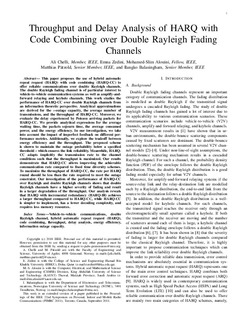| dc.contributor.author | Chelli, Ali | |
| dc.contributor.author | Zedini, Emna | |
| dc.contributor.author | Alouini, Mohamed-Slim | |
| dc.contributor.author | Pätzold, Matthias Uwe | |
| dc.contributor.author | Balasingham, Ilangko | |
| dc.date.accessioned | 2019-03-22T07:48:44Z | |
| dc.date.available | 2019-03-22T07:48:44Z | |
| dc.date.created | 2018-01-19T13:35:49Z | |
| dc.date.issued | 2018 | |
| dc.identifier.citation | IEEE Transactions on Vehicular Technology. 2018, 67 (5), 4233-4247. | nb_NO |
| dc.identifier.issn | 0018-9545 | |
| dc.identifier.uri | http://hdl.handle.net/11250/2591179 | |
| dc.description.abstract | This paper proposes the use of hybrid automatic repeat request (HARQ) with code combining (HARQ-CC) to offer reliable communications over double Rayleigh channels. The double Rayleigh fading channel is of particular interest to vehicleto-vehicle communication systems as well as amplify-and-forward relaying and keyhole channels. This paper studies the performance of HARQ-CC over double Rayleigh channels from an information theoretic perspective. Analytical approximations are derived for the ϵ-outage capacity, the average number of transmissions, and the throughput of HARQ-CC. Moreover, we evaluate the delay experienced by Poisson-arriving packets for HARQ-CC. We provide analytical expressions for the average waiting time, the packets sojourn time, the average consumed power, and the energy efficiency. In our investigation, we take into account the impact of imperfect feedback on different performance metrics. Additionally, we explore the tradeoff between energy efficiency and the throughput. The proposed scheme is shown to maintain the outage probability below a specified threshold ϵ, which ensures the link reliability. Meanwhile, HARQ-CC adapts implicitly the transmission rate to the channel conditions such that the throughput is maximized. Our results demonstrate that HARQ-CC allows improving the achievable communication rate compared to fixed time diversity schemes. To maximize the throughput of HARQ-CC, the rate per HARQ round should be less than the rate required to meet the outage constraint. Our investigation of the performance of HARQ-CC over Rayleigh and double Rayleigh channels shows that double Rayleigh channels have a higher severity of fading and result in a larger degradation of the throughput. Our analysis reveals that HARQ with incremental redundancy achieves a larger throughput compared to HARQ-CC, whereas HARQ-CC is simpler to implement, has a lower decoding complexity, and requires less memory resources. | nb_NO |
| dc.language.iso | eng | nb_NO |
| dc.publisher | Institute of Electrical and Electronics Engineers (IEEE) | nb_NO |
| dc.title | Throughput and delay analysis of HARQ with code combining over double Rayleigh fading channels | nb_NO |
| dc.type | Journal article | nb_NO |
| dc.type | Peer reviewed | nb_NO |
| dc.description.version | acceptedVersion | nb_NO |
| dc.source.pagenumber | 4233-4247 | nb_NO |
| dc.source.volume | 67 | nb_NO |
| dc.source.journal | IEEE Transactions on Vehicular Technology | nb_NO |
| dc.source.issue | 5 | nb_NO |
| dc.identifier.doi | 10.1109/TVT.2018.2794183 | |
| dc.identifier.cristin | 1547519 | |
| dc.relation.project | Norges forskningsråd: 261895 | nb_NO |
| dc.description.localcode | © 2018 IEEE. Personal use of this material is permitted. Permission from IEEE must be obtained for all other uses, in any current or future media, including reprinting/republishing this material for advertising or promotional purposes, creating new collective works, for resale or redistribution to servers or lists, or reuse of any copyrighted component of this work in other works. | nb_NO |
| cristin.unitcode | 194,63,35,0 | |
| cristin.unitname | Institutt for elektroniske systemer | |
| cristin.ispublished | true | |
| cristin.fulltext | postprint | |
| cristin.qualitycode | 2 | |
